In 2009, CNN casually covered the Swine flu pandemic under Obama. In 2020, CNN started lambasting Trump in its coronavirus coverage.
In 2009, at the height of the H1N1 pandemic commonly referred to as “swine flu,” the U.S. Centers for Disease Control (CDC) suggested Americans should shut down schools, begin working from home, and quarantine themselves. Americans made minimal changes to their routines. Eleven years later, a new pandemic arose with similar CDC suggestions, but an entirely different reaction.
Americans are stockpiling toilet paper and many are taking extreme precautions to self-quarantine in these so-called unprecedented times. In the new age of “fake news,” the question must be asked whether the media has any effect on the American people’s and government’s response to a Chinese virus.
Flashback to 2009, when CNN took a casual approach to the swine flu pandemic. They published an article saying the regular flu and the swine flu were essentially the same. Instead of focusing on the pandemic, they focused on other news. The American people’s response: relaxed.
Flash forward to 2020: CNN is lambasting the Trump administration and covering the coronavirus at all hours of the day. The American people’s response: panicked.
Here’s a comparison timeline of CNN’s coverage of the 2009 Swine flu pandemic. Hat tip to this Twitter account for first investigating the differences:
THREAD:Time travel edition. Let's go back to April 29, 2009 read the CNN website front page news coverage of H1N1 / SwineFlu pandemic. I'll post the highlights of their coverage from the day WHO elevated pandemic threat level to 5 (out of 6) to day Obama declared nat'l emgy.— ⭐️⭐️⭐️Indictments Now. (@BodiazRising) March 17, 2020
April 28, 2009
CNN’s front page compared the swine flu to the regular flu, pointing out the amount of deaths per year of the regular flu.
“An outbreak of swine flu that is suspected in more than 150 deaths in Mexico and has sickened dozens in the U.S. and elsewhere has grabbed the attention of a nervous public and medical officials worried the strain will continue to spread,” CNN wrote. “But even if there are swine-flu deaths outside Mexico, the virus would have a long way to go to match the 36,000 seasonal flu deaths in the U.S. each year.”
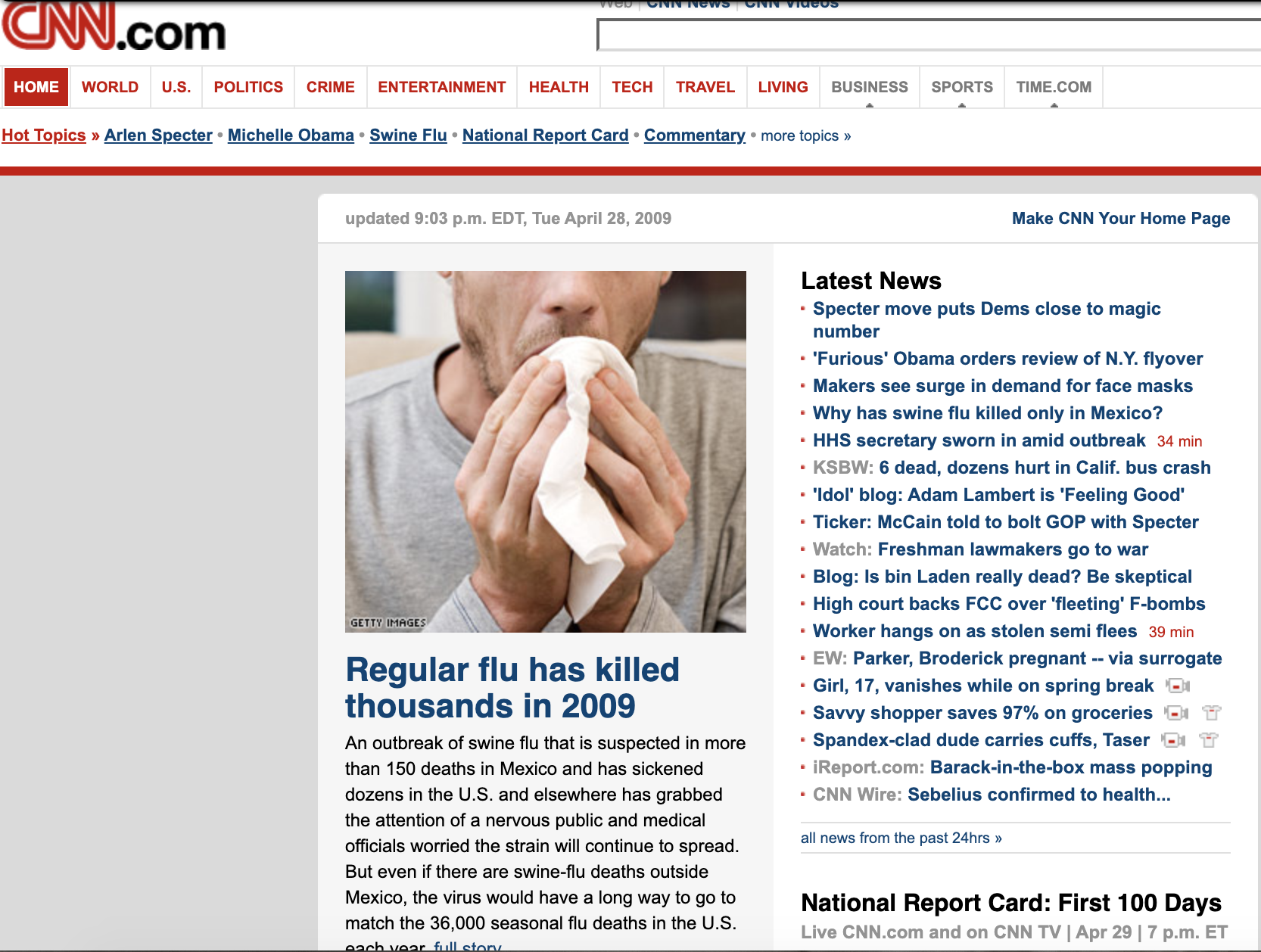
April 29, 2009
The very next day, the World Health Organization (WHO) raised the pandemic level to a five out of six.
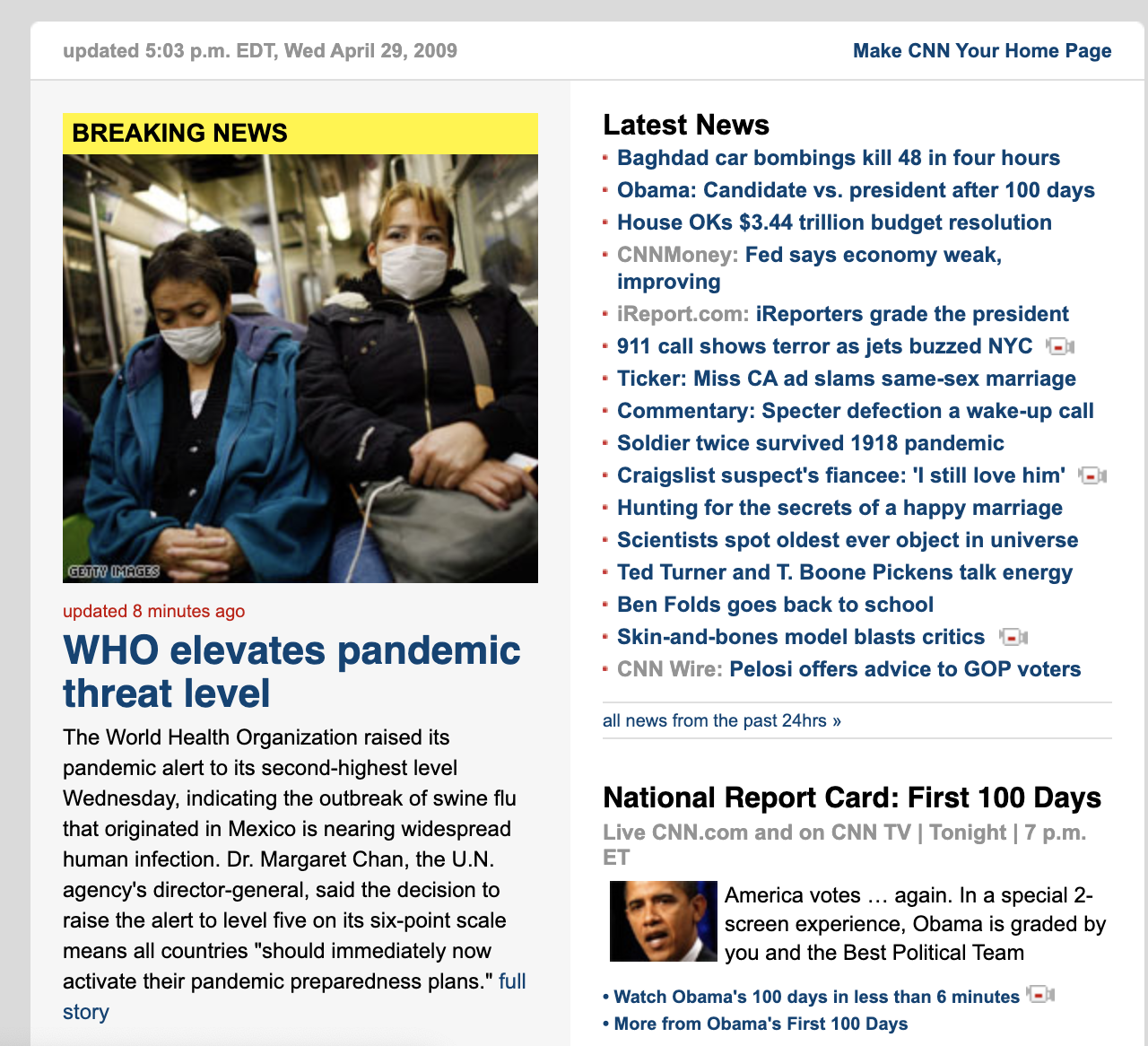
May 5, 2009
Two Americans passed away from the swine flu, including one young child and a 33-year-old pregnant teacher who gave birth via C-section while in a coma. The first cases were detected in the U.S. Navy and the CDC issued a new recomendation for schools to close.
Instead of covering this news, CNN’s featured story was Federal Reserve Chairman Ben Bernanke saying the U.S. economy is stabilizing and “U.S. face transplant recipient offers thanks.” The the only related article on CNN’s home page was how the Swine flu could put a damper on Cinco de Mayo.

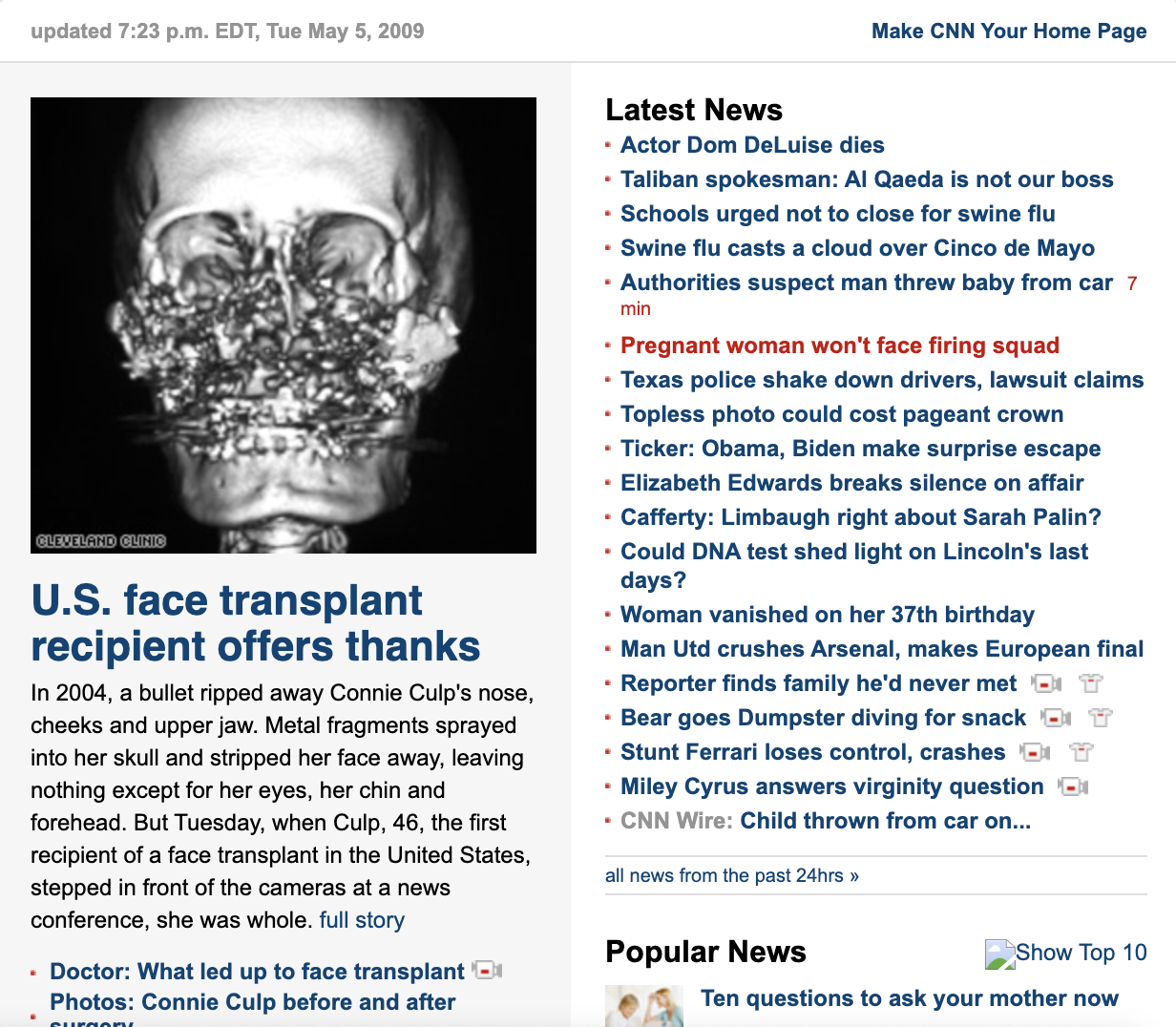
May 8, 2009
The United States experienced a third Swine flu death and surpassed Mexico with the number of confirmed cases. CNN’s coverage focused on a pastry chef who received a double hand transplant. Its headlines list contained positive economic news and one mention of the growth of U.S. swine flu cases to 1,600.
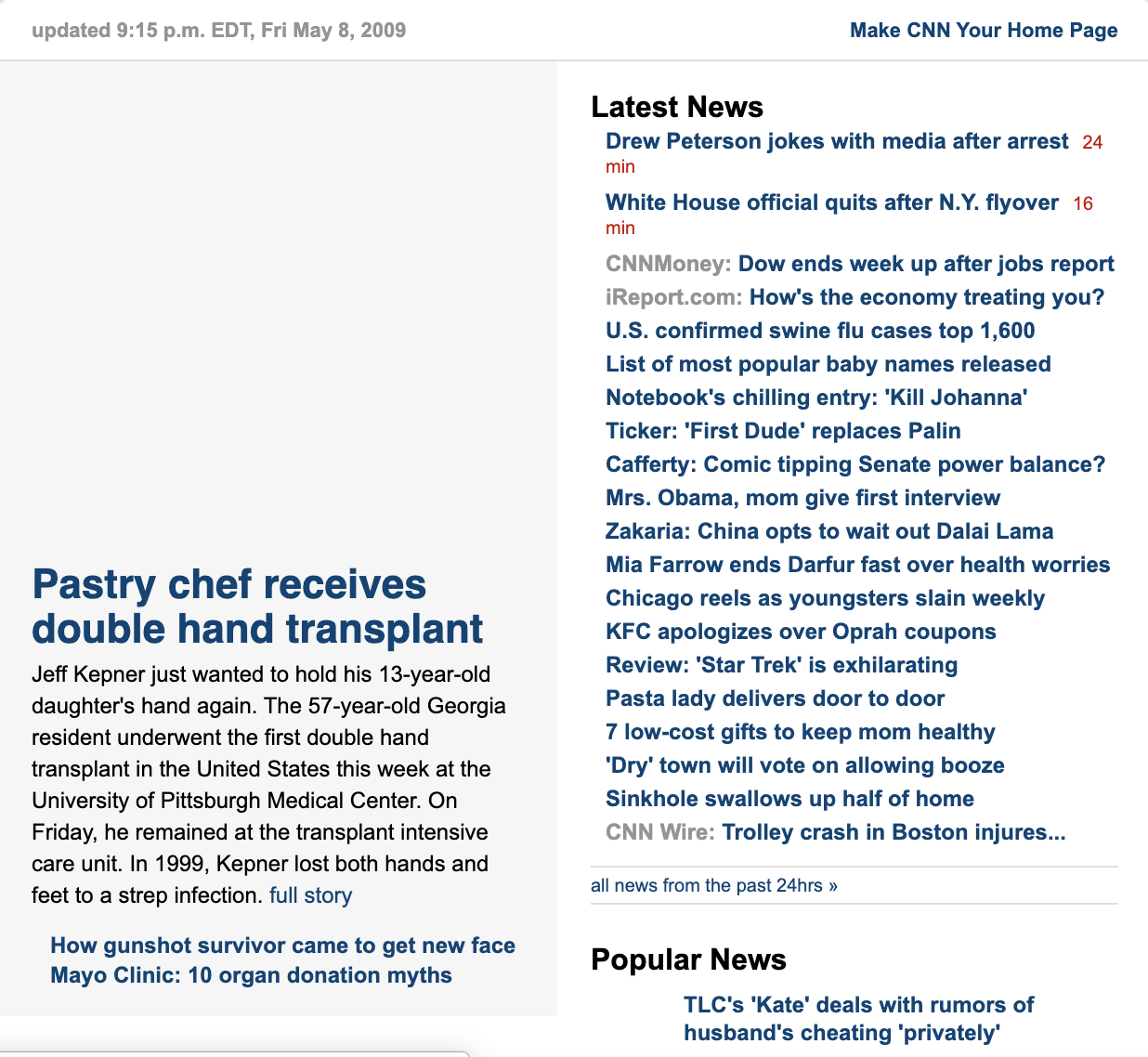
October 16, 2009
A vaccine for the Swine flu was created, but the BBC reported shortages in the vaccine.
“US officials have warned of delays in the delivery of swine flu vaccines just as deaths from the H1N1 virus climb above epidemic level in some states,” the BCC reported.
On CNN.com, there was not a single critique of President Barack Obama for his inability to roll out the vaccine broadly to concerned Americans. It included one article listed under “latest news” stating H1N1 is infecting children at an alarming rate. The featured story was a 6-year-old child who chased after his Mylar balloon.
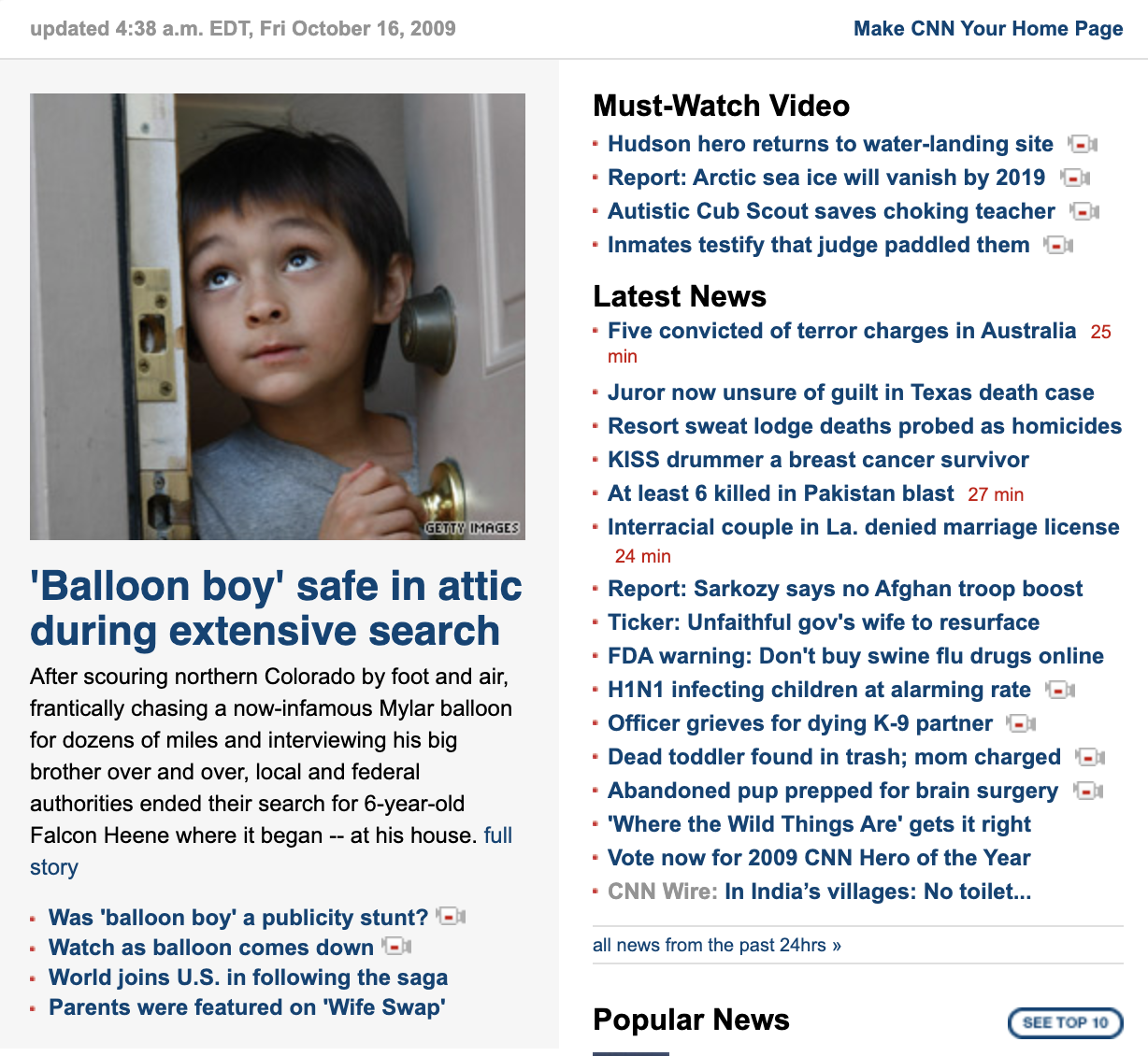
October 24, 2009
Obama signed a National Emergency Declaration in response to the swine flu. CNN did report on Obama’s declaration, yet put coverage second to an opinion piece giving Obama suggestions for his oh-so successful presidency. “Opinion: 5 lessons for Obama” was a priority headline for CNN, in comparison to Obama declaring H1N1 a national emergency, which was again relegated to a list of tiny one-line links.

Now compare CNN’s 2009 coverage of the swine flu to their 2020 coverage on coronavirus and President Trump’s handling of the situation.
January 31, 2020
After coronavirus reached the United States and the White House announced a coronavirus task force, Trump attempted to mitigate its spread by shutting down travel to and from China.
CNN covered the Trump administration’s announcement extensively and conflated Trump’s “Muslim bans” with travel restrictions he implemented due to coronavirus.
“The Trump administration has announced an expansion of the travel ban — one of the President’s signature policies, which has been derided by critics as an attempt to ban Muslims from the US — to include six new countries,” CNN wrote.
Their homepage had a large focus on the impeachment trial of Donald Trump, but left room for news about the coronavirus and travel bans from China.
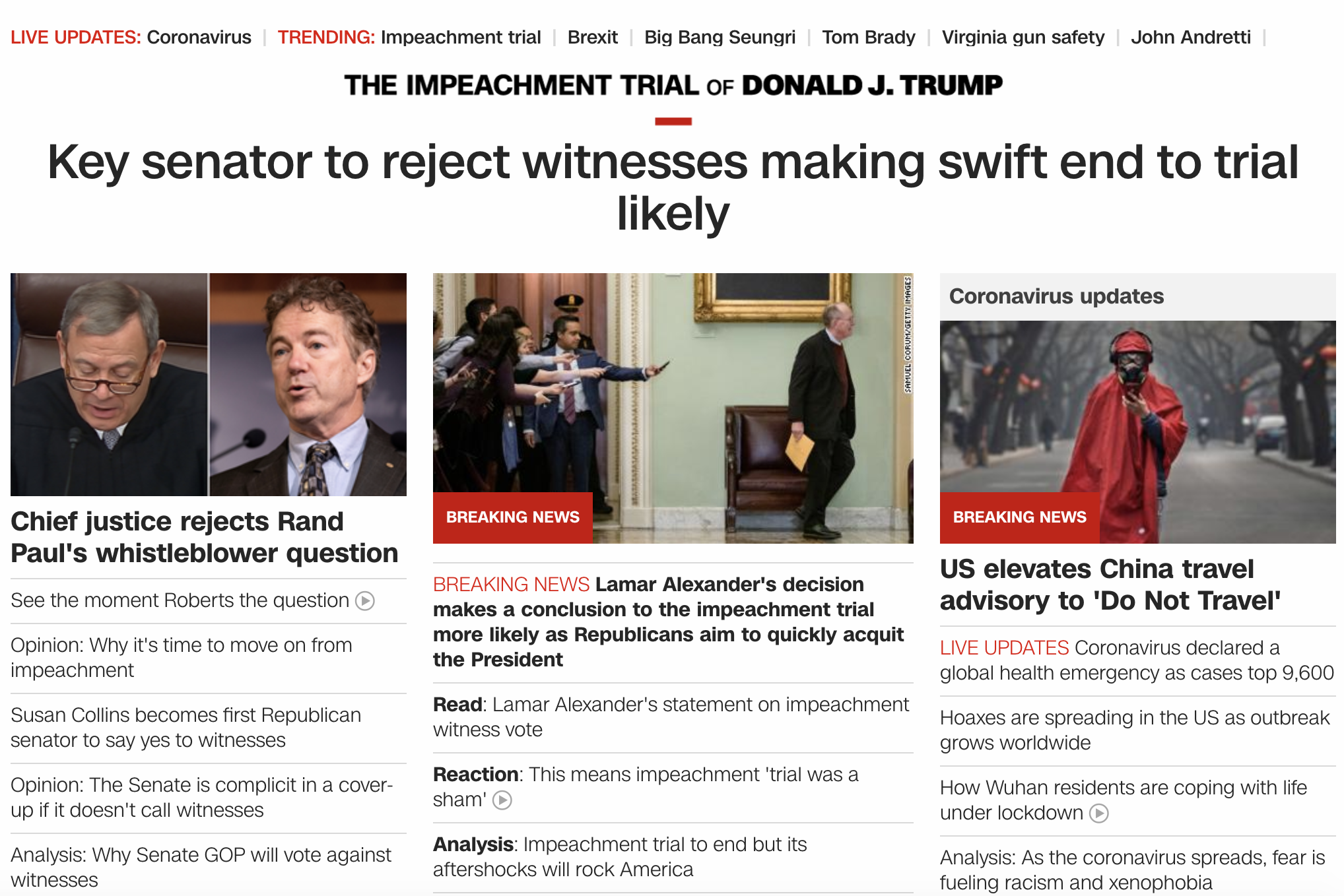
February 26, 2020
Vice President Mike Pence was tapped to head the coronavirus task force. Rep. Debbie Dingell took to CNN to spout off her worries about President Trump’s handling of the coronavirus.
“I’m worried about the discrepancies between what the President says and his team says,” Dingell said.
“I’m worried about the discrepancies between what the President says and his team says," Democratic @RepDebDingell says about the White House's coronavirus response.
— CNN (@CNN) February 26, 2020
“We’ve got to figure out how quickly we can bring manufacturing of equipment and drugs… back to this country.” pic.twitter.com/LDlTjYcANn
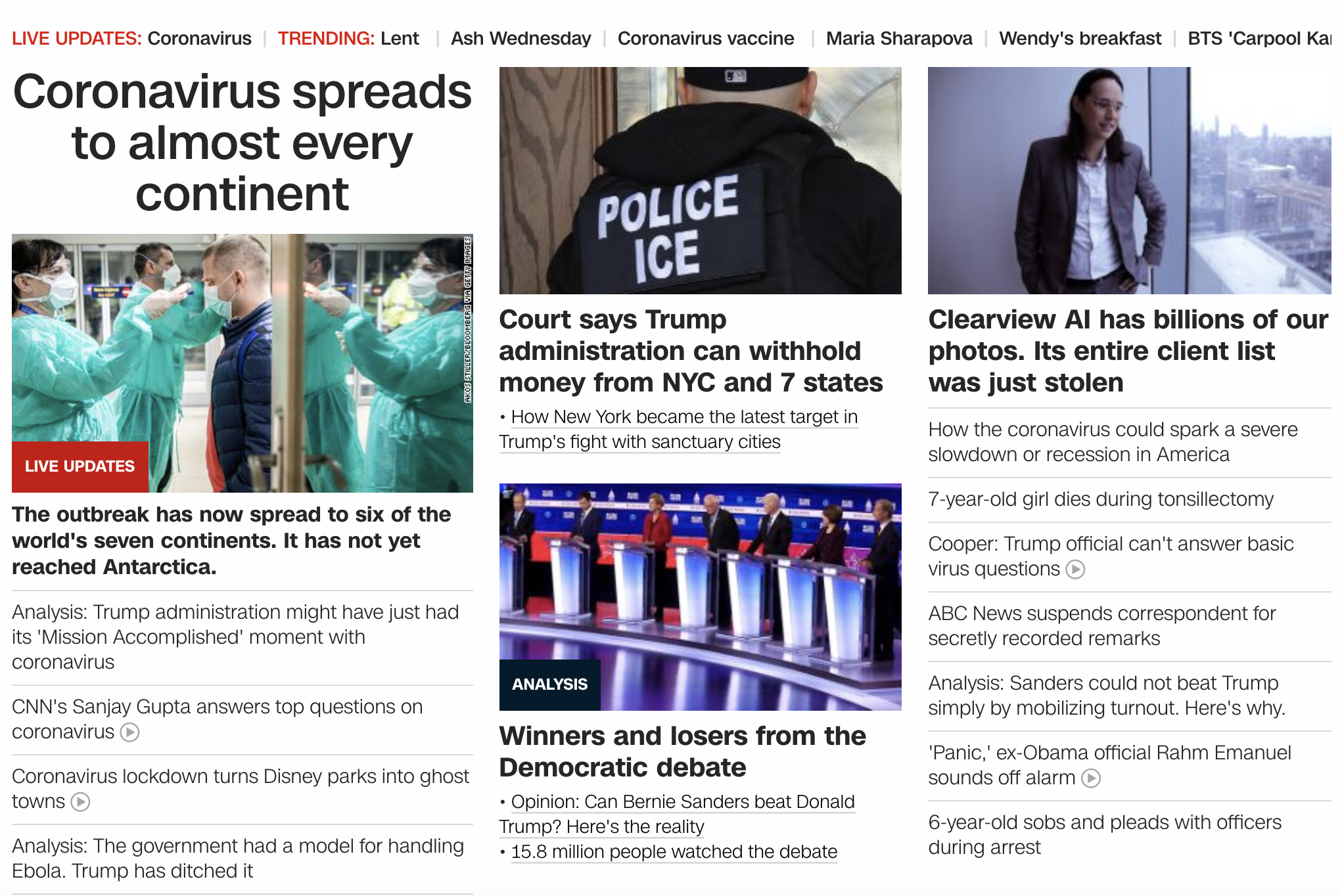
February 29, 2020
On this day, the first United States death by coronavirus took place. CNN pushed out tips for staying healthy during the coronavirus pandemic.
Their opinion section focused on President Trump’s supposed inability to govern during the pandemic.
“Like all President before him, his ability to govern (and in Trump’s case, be reelected) will be judged by his performance during crisis in the next weeks and months,” CNN’s Joe Lockhart wrote.
CNN’s homepage included extensive coronavirus coverage, Lockhart’s opinion piece, as well as CNN anchor Don Lemon slamming Trump’s “classic gaslighting” over coronavirus’s impact.

CNN spend so much time covering coronavirus, they even reported on a dog who tested a “weak positive” for the disease in Hong Kong.
March 11, 2020
The WHO declared coronavirus a pandemic. CNN reported this fact, but highlighted an article fact checking President Trump and his “dishonesty” amid coronavirus.
“President Trump has been misinforming the public about the coronavirus. Here’s a chronological of 28 different way the President and his team have been inaccurate,” CNN wrote.
In case the American public wasn’t worried enough, CNN’s Zach Wolf wrote an article titled, “Coronavirus is about the change your life.” This article was the headline of the website.
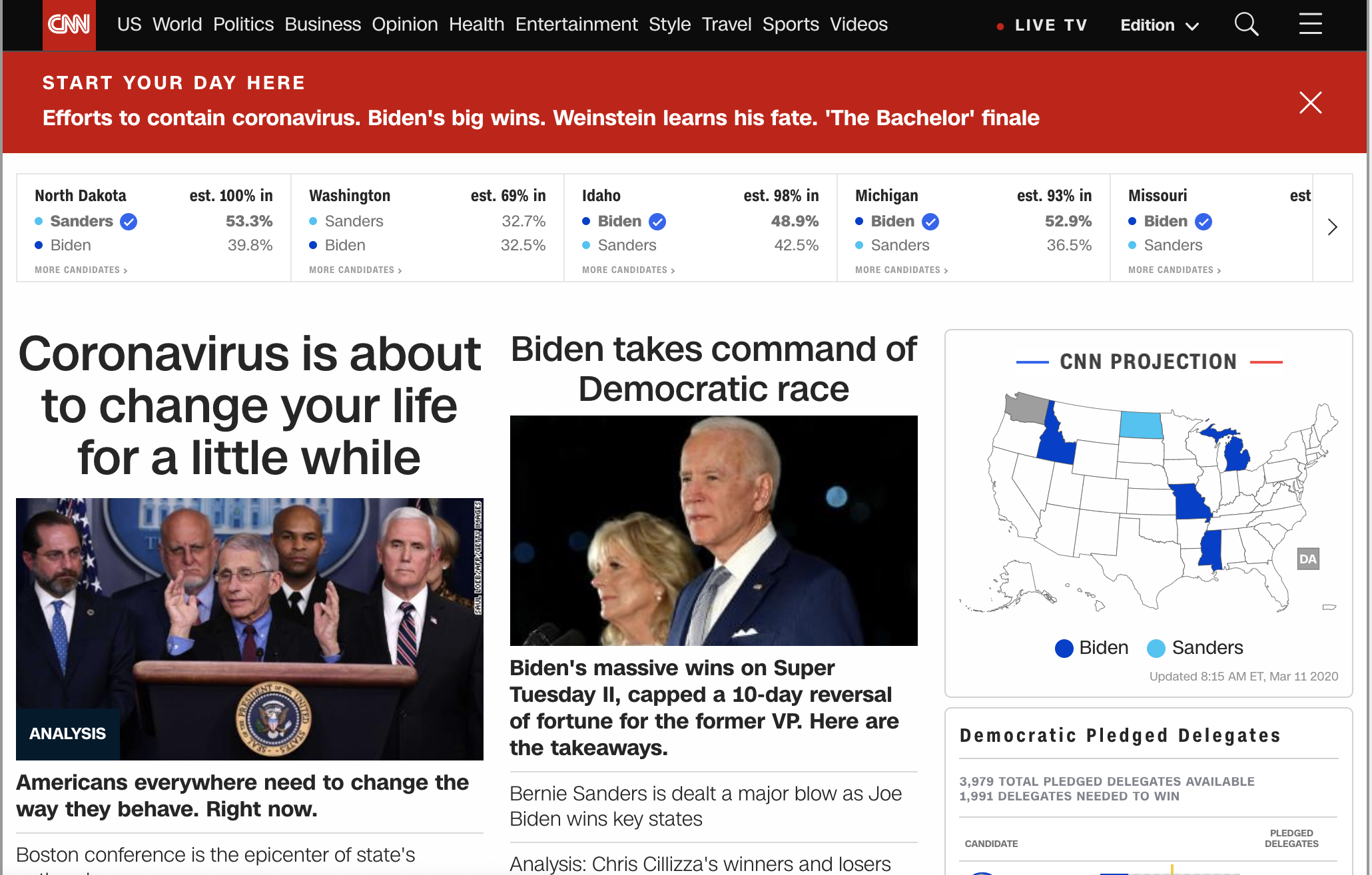
March 13, 2020
President Trump declared a national emergency amid the panic of coronavirus. The new outlet’s main headline read: “America is on hold.” CNN also published an analysis of the “struggling administration’s” failures amid the virus spread.
“But the administration’s public health experts have no idea how bad the US coronavirus outbreak will get, since bottlenecks in lab testing and faults with diagnosis kits mean they can’t know how many infections there really are,” CNN’s Stephen Collinson wrote. He continued to blame President Trump for failures over coronavirus testing kits.
They extensively covered the outbreak as well as the impact the virus was having on global stocks.
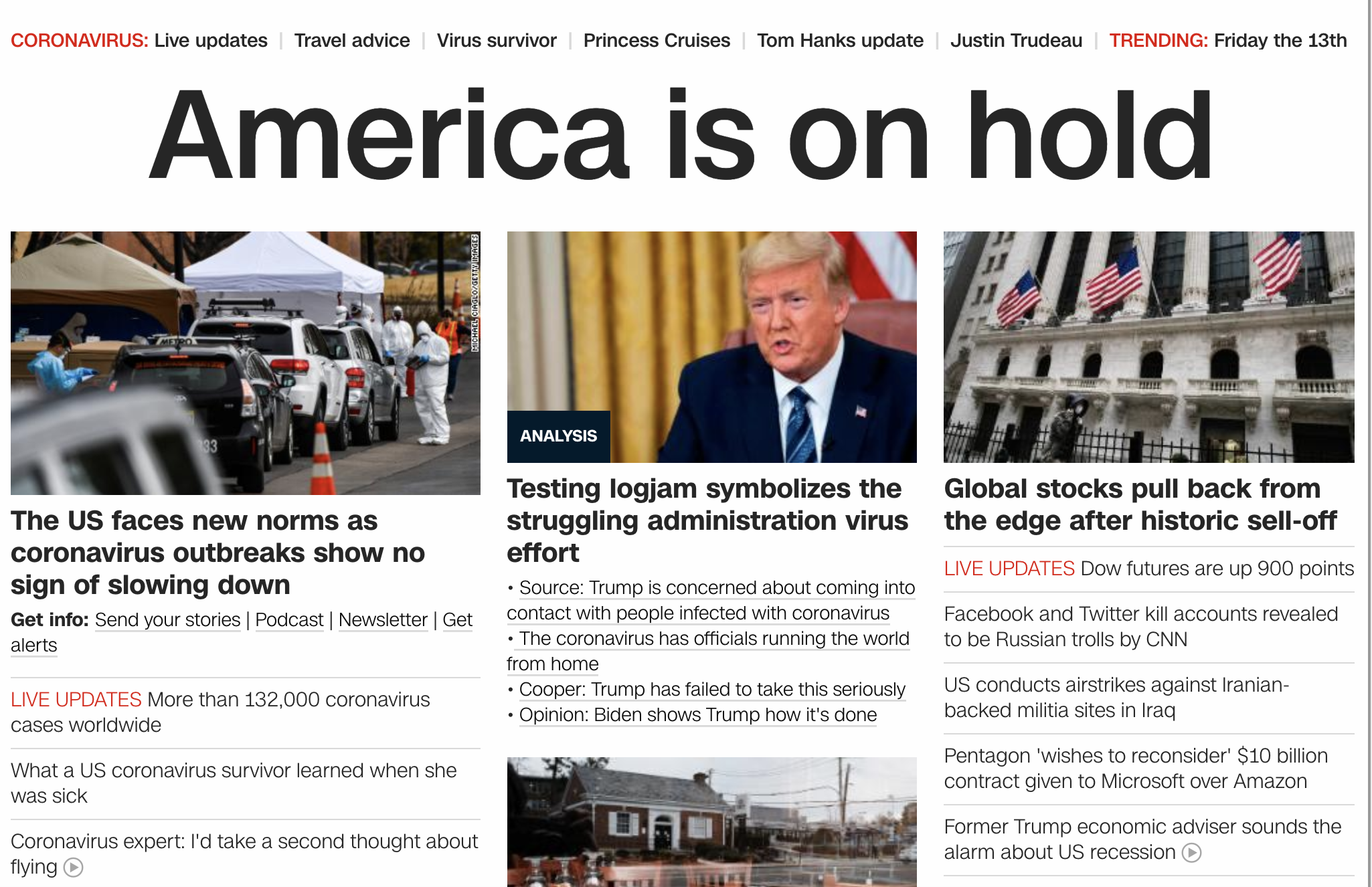
CNN’s narrative about disease is clear: a Democratic President can handle a pandemic, therefore the world can relax, whereas a Republican President cannot handle a pandemic, therefore the world should panic.
CNN’s hyper-partisan and hyperbolic narrative is dangerous to the sanity and health of the world in times of global pandemic.



